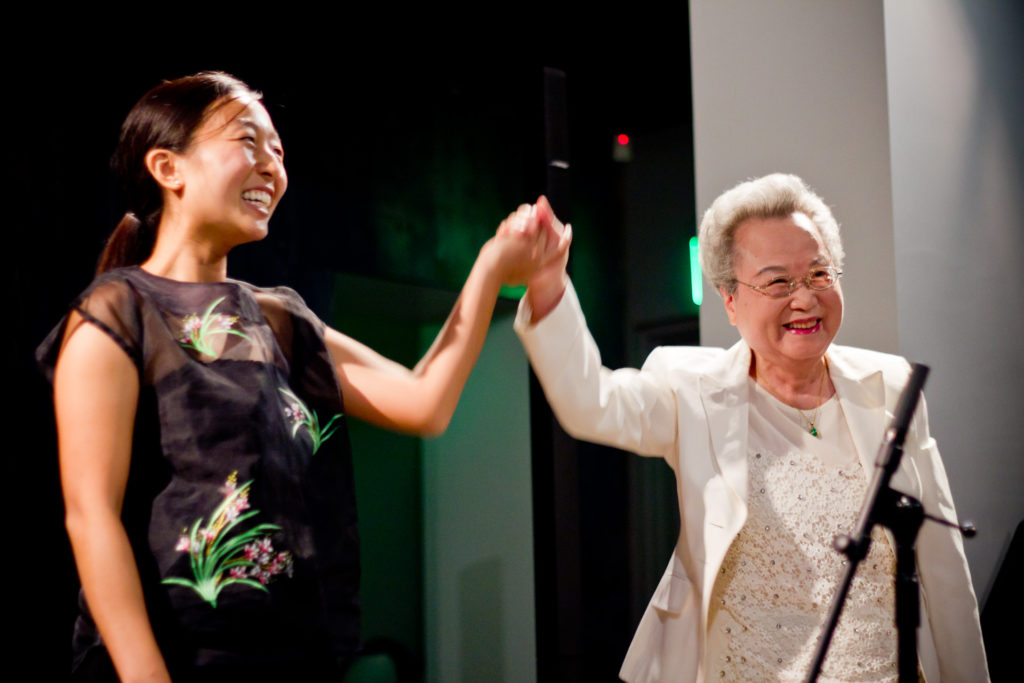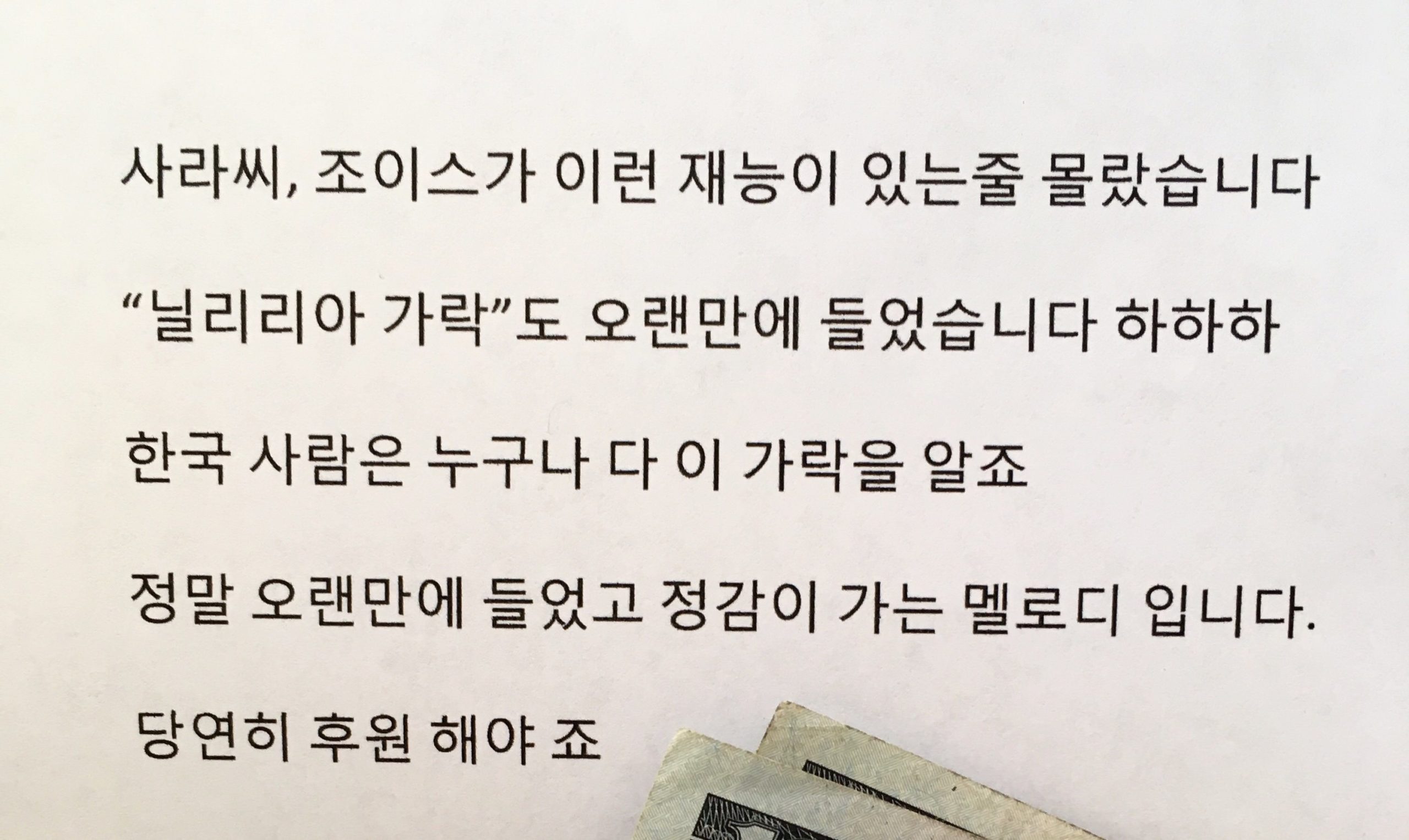18 Oct Nililiya, Part I: Koreanness
I’m publishing a blog post every Friday on a track from my album Dream of Home. Feel free to start reading from the first post on the title track.
Oral tradition
As has been done for centuries, folk songs continue to be passed down from one generation to the next orally. So naturally, I learned the Korean folk song 늴리리야 from an elder—via YouTube in keeping with the ways of my generation. I was looking for a folk song to add to the album but I didn’t want to do something as obvious as 아리랑 “Arirang” or as popular a cover as 새야새야 “Sehya Sehya,” which has been done by everyone from the great coloratura Sumi Jo with the London Philharmonic to little old me in college (I’ll get around to sharing it someday). So I flipped through my gayageum music book, dogeared this one and then went to YouTube to see what I could find.
I had referenced another YouTube video for the traditional 굿거리 rhythm but I see that the video has been taken down. A good reminder that digital resources, too, can die.
Let me touch on “Arirang” as a related aside since it’s the introduction to Korean folk music for virtually everyone, including Koreans. The folk song, of which there are regional variations from different provinces in Korea, shows up not only in events and recordings celebrating Korean culture but also in foreign settings from the repertoire of Kodaly choral instructors to an American hymnal. My late gayageum teacher 할머니 would never fail to point out that the song was designated an Intangible Cultural Heritage of Humanity by UNESCO, beaming with pride. And she’d ask me rhetorically, “Can the piano play all the notes that our gayageum can?” I loved that she was so proud of our music and she instilled that feeling in me. This sense of the collective “our” is a core part of Korean music, of Korean identity. It’s sort of like every folk song is a national anthem, capable of stirring up and fortifying a shared “Koreanness” among Koreans. My feeling is that American folk songs (in this case, I’m referring to songs like “Shenandoah”) do not function in the same way but I need to give that some thought.

I did notice a twisted form of that pride though while in Korea for a couple years to study gayageum. Traditional music seemed to be respected and revered more abroad and for its recognition by foreign and international bodies rather than for its intrinsic beauty and value. As the late gayageum player/composer Hwang Byung-Ki said (in a class of his I sat in on at Yonsei University many years ago), it’s a shame that Beethoven and Mozart have become the musical forefathers for Koreans, which is not only a national tragedy but a loss for the world, if you ask me. I heard on the radio yesterday that U.S. dairy cows have lost genetic variation and are now descended from two bulls; I wonder if having the same musical ancestors homogenizes musical cultures.
With each paragraph I write, I’m thinking of diverging topics on Koreanness that are not within the scope of this blog post on my album track. I probably won’t get around to writing about it otherwise so please excuse me peppering in some here liberally while I’m already writing.
Nililiya
늴리리야! What does “Nililiya” mean? My long-time friend HeeSung 언니 (who helped me take video of the recording sessions for this track) told me it’s like saying “lalala,” an onomatopoeia that doesn’t mean anything specific, though if I’m remembering what I was told correctly, it was used in old Korean as a happy exclamation.
My mom told me that everyone of her generation knows “Nililiya” and I’ve gathered that the ubiquity extends to younger generations, though I don’t how far down. A Korean American emailed me apologizing for being a bad Korean, having only been introduced to the song through my album. Well, even though I learned it through the time-tested tradition of oral transmission (on the most popular meeting spot YouTube as I mentioned), I don’t know that I believe Koreans of the diaspora not knowing Korean things or the language makes them less Korean. This is a book of its own that someone else should write/maybe has already written so I’ll move on but I want to share that I’m happy that my album is connecting Korean Americans to their heritage and acting as an accessible introduction to Korean folk music for people and I hope that it’ll lead some to check out legit/traditional gayageum music that shows the depth and wailing tones of the instrument.
I used a snippet of the song for my Kickstarter campaign for the album and below is a letter my mom received in response from someone she knows through work. It reads:
Sarah, I did not know Joyce had such a talent. And it’s been a while since I’ve heard the melody to “Nililiya” hahaha. Every Korean knows this song. It’s really been a long time since I’ve heard it and it’s a song that evokes emotions. Of course I will give my support.

This might be the same man who mentioned he had to support my campaign because he was afraid my mom wouldn’t do business with him otherwise. While said at least partially in jest, it would have fallen outside the norms of Korean fraternal and professional relationships if he didn’t contribute. Because of the importance placed on the collective well-being, when my mom, whom I’d call a pillar of her community in Koreatown, put out the call for support on my album, her friends and colleagues recognized it as a life milestone and contributed accordingly. That was obviously great for my fundraising campaign. But while the upside is that Koreans will have your back, sometimes the expectations can be overbearing, especially as you navigate society as a multicultural person and prioritize individual needs (called “self-care” in American speak).
Oops, this turned into a post about Koreanness
This post has already reached the length of my other album blog posts and I’ve yet to get into the arranging and recording process so I’m just gonna call it and write a part two on “Nililiya” later. As a reward for getting this far, here’s the “Sehya Sehya” (means “Bird Bird”) track that I said I’ll try to share someday. (I wanted to animate an illustration to it but first I have to figure out how to do that, conceptualize and draw the illustrations, and make time, so it’ll be another couple years at minimum and quite likely many more or possibly never.)
I heard the gayageum player/singer-songwriter Jung Min-A sing this on the album I bought of hers after meeting her at a world music festival in Korea, where HeeSung 언니 and I met as volunteers. I had no special interest in the gayageum itself, let alone playing it then, but I liked the melody paired with the “Autumn Leaves” changes and recorded it in the basement of UC Jazz on campus with my best friends Jack (recording engineer) and Amy (clarinet) as well as my good friends Nick (flute) and Jesse (guitar). It’s not a prime example of my singing and my late teacher made fun of me for enunciating forcefully when I had her listen to it but I still love this recording. After a stressful night in which the least of our worries was that the equipment malfunctioned and Jack had to improvise a work-around, we all synced up for this take and that feeling was palpable as we recorded it. Magic.
___
Read part two on “Nililiya” here.
Find Dream of Home on YouTube Music, Bandcamp, Apple Music, Amazon, and Spotify.


NK
Posted at 15:16h, 18 OctoberI purchased your song Nililiya as an mp3 so that I could include it in my mother’s 환갑 this past spring. My mother and her siblings recognized the track immediately when we played it along a slideshow of photos from when they were children growing up in Korea in the fifties and sixties. They were surprised, amused, and I think quite affected to hear something at once new and deeply familiar. Some of my cousins picked up on this, too, and one noted that it seemed fitting for the family occasion with Korean and Western instrumentation and sound, English and Korean lyrics. The song as you’ve interpreted it captured something intergenerational, exquisitely Korean and also Korean-immigrant (in keeping with the tender themes of “Dream of Home”). Anyway, thank you very much for the song. I am really grateful someone is making music like this in our time.
voicekwon
Posted at 23:10h, 18 OctoberAw I love that, thanks for sharing your family story and the kind words.